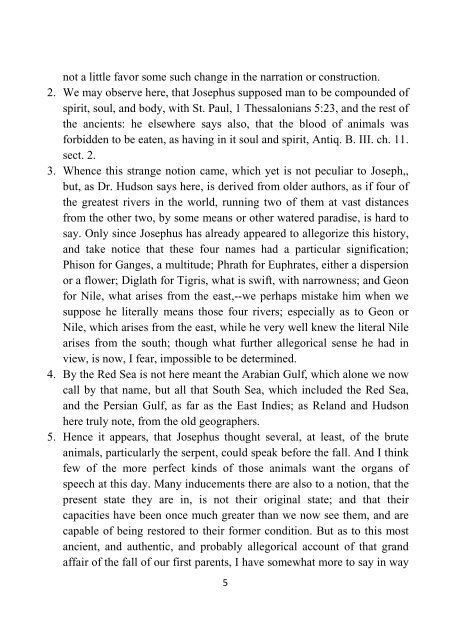From the Creation to the Death of Isaac - Flavius Josephus
- No tags were found...
Create successful ePaper yourself
Turn your PDF publications into a flip-book with our unique Google optimized e-Paper software.
not a little favor some such change in <strong>the</strong> narration or construction.<br />
2. We may observe here, that <strong>Josephus</strong> supposed man <strong>to</strong> be compounded <strong>of</strong><br />
spirit, soul, and body, with St. Paul, 1 Thessalonians 5:23, and <strong>the</strong> rest <strong>of</strong><br />
<strong>the</strong> ancients: he elsewhere says also, that <strong>the</strong> blood <strong>of</strong> animals was<br />
forbidden <strong>to</strong> be eaten, as having in it soul and spirit, Antiq. B. III. ch. 11.<br />
sect. 2.<br />
3. Whence this strange notion came, which yet is not peculiar <strong>to</strong> Joseph,,<br />
but, as Dr. Hudson says here, is derived from older authors, as if four <strong>of</strong><br />
<strong>the</strong> greatest rivers in <strong>the</strong> world, running two <strong>of</strong> <strong>the</strong>m at vast distances<br />
from <strong>the</strong> o<strong>the</strong>r two, by some means or o<strong>the</strong>r watered paradise, is hard <strong>to</strong><br />
say. Only since <strong>Josephus</strong> has already appeared <strong>to</strong> allegorize this his<strong>to</strong>ry,<br />
and take notice that <strong>the</strong>se four names had a particular signification;<br />
Phison for Ganges, a multitude; Phrath for Euphrates, ei<strong>the</strong>r a dispersion<br />
or a flower; Diglath for Tigris, what is swift, with narrowness; and Geon<br />
for Nile, what arises from <strong>the</strong> east,--we perhaps mistake him when we<br />
suppose he literally means those four rivers; especially as <strong>to</strong> Geon or<br />
Nile, which arises from <strong>the</strong> east, while he very well knew <strong>the</strong> literal Nile<br />
arises from <strong>the</strong> south; though what fur<strong>the</strong>r allegorical sense he had in<br />
view, is now, I fear, impossible <strong>to</strong> be determined.<br />
4. By <strong>the</strong> Red Sea is not here meant <strong>the</strong> Arabian Gulf, which alone we now<br />
call by that name, but all that South Sea, which included <strong>the</strong> Red Sea,<br />
and <strong>the</strong> Persian Gulf, as far as <strong>the</strong> East Indies; as Reland and Hudson<br />
here truly note, from <strong>the</strong> old geographers.<br />
5. Hence it appears, that <strong>Josephus</strong> thought several, at least, <strong>of</strong> <strong>the</strong> brute<br />
animals, particularly <strong>the</strong> serpent, could speak before <strong>the</strong> fall. And I think<br />
few <strong>of</strong> <strong>the</strong> more perfect kinds <strong>of</strong> those animals want <strong>the</strong> organs <strong>of</strong><br />
speech at this day. Many inducements <strong>the</strong>re are also <strong>to</strong> a notion, that <strong>the</strong><br />
present state <strong>the</strong>y are in, is not <strong>the</strong>ir original state; and that <strong>the</strong>ir<br />
capacities have been once much greater than we now see <strong>the</strong>m, and are<br />
capable <strong>of</strong> being res<strong>to</strong>red <strong>to</strong> <strong>the</strong>ir former condition. But as <strong>to</strong> this most<br />
ancient, and au<strong>the</strong>ntic, and probably allegorical account <strong>of</strong> that grand<br />
affair <strong>of</strong> <strong>the</strong> fall <strong>of</strong> our first parents, I have somewhat more <strong>to</strong> say in way<br />
5

















